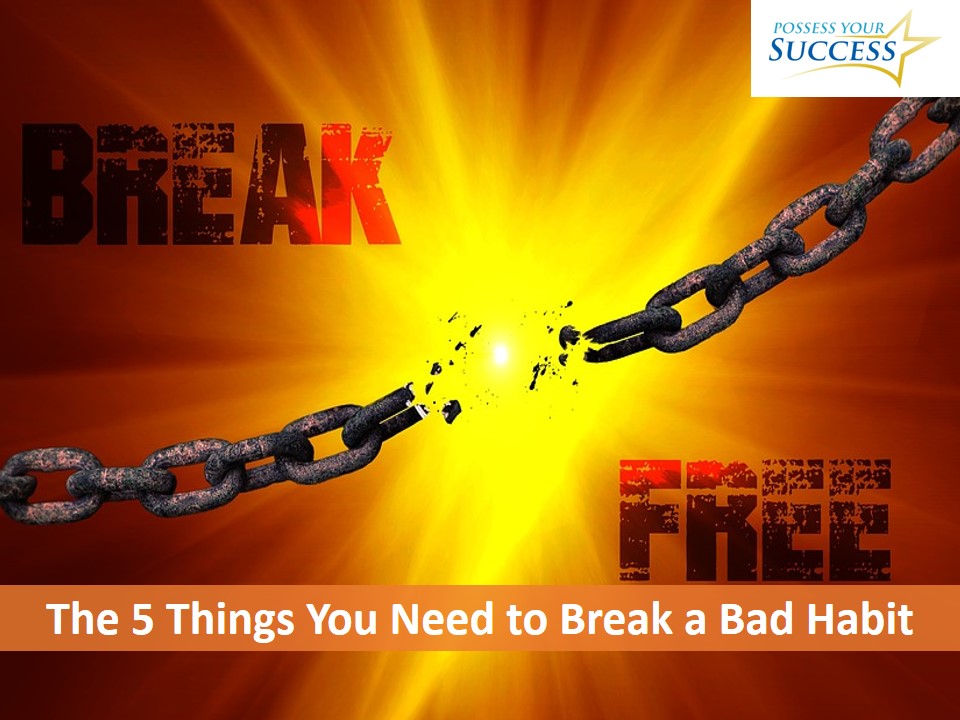The 5 Things You Need to Break a Bad Habit

We all know that it’s tough to break a bad habit … but why?
As humans we love habits. In essence, they are our mind’s attempt at automation, aimed to help take some of the pressure off so we don’t have to actively think so much.
Instead of focusing on all of the ridiculous amount of information thrown at us everyday, we can simply go on “autopilot”, processing things in the background so we can focus only on the things that matter.
This means that for the most part, habits are a useful–and even necessary–part of our lives. However, it can completely backfire when we develop bad habits. They’re sticky, nasty, and in many cases, prevent us from being the success we’ve always wanted to be.
To break a bad habit, most people resort to sheer willpower, which is usually ineffective.Willpower is great for short-term bursts of focus and discipline, but as stress mounts or when your brain is fatigued, your willpower will likely fail you. It’s also when your autopilot will kick in, and if it’s set to the wrong habit, you’re sunk.
Thus, you need more than that to stay consistent.
That’s why I designed my 5 Essential Forces of Success model, the 5 forces that the ultra-successful use to stay ultra-successful. When used correctly, they will bolster your confidence and help you win against those pesky habits. It’s something I discuss in detail in my free e-book, which you can download here.
1. Drive. This is your motivation to break a bad habit. What makes you even want to do so in the first place? As Simon Sinek explains, you must start with why. When you have a big enough why, the how will begin to take care of itself.
2. Ambition. Is the bad habit challenging to you? Sometimes we trivialize the habit as unimportant or underestimate its impact on our lives and the lives of those around us. In other cases, we let ourselves off easy by not setting and committing to challenging deadlines that spur action. We need to see these habits as urgent matters that require our immediate and constant attention so challenge yourself to eliminate and/or replace them.
3. Preparation. How are you going to tackle the bad habit? What are you going to do when situations/temptations arise? What happens if you relapse? It’s time to craft your battle plan, your schedule, or your process and stick to it. Keep in mind that no plan is 100% perfect, but even taking the few minutes to write down how you are going to achieve something will keep you committed to that goal. You can always adjust on-the-fly.
4. Accountability. You must own your mistakes, struggles, and triumphs. This is YOUR habit, and this is YOUR life. No one will care more about you than you. However, this does not mean you have to go it alone. Seek help from mentors and accountability partners who have either already gone through the process or are going through it now to ensure you are staying on track. Misery loves company, right?
5. Faith. You must fully believe that you WILL break the habit. Easier said than done, right? To increase that faith, follow people who have broken that bad habit. Continue to read inspirational and positive messages daily. Speak affirmations to actively state your intentions to yourself. All of these things will help bolster your faith and get you through those valleys of temptation.
These 5 Essential forces are the keys to stop that vicious cycle bad habits keep you trapped in, but if you want to completely avoid relapse, you must replace them with good ones! Build positive habits that will keep you distracted from the negative ones that are holding you back. That, combined with the 5 forces above, will ensure you crush any habit that does you harm.
